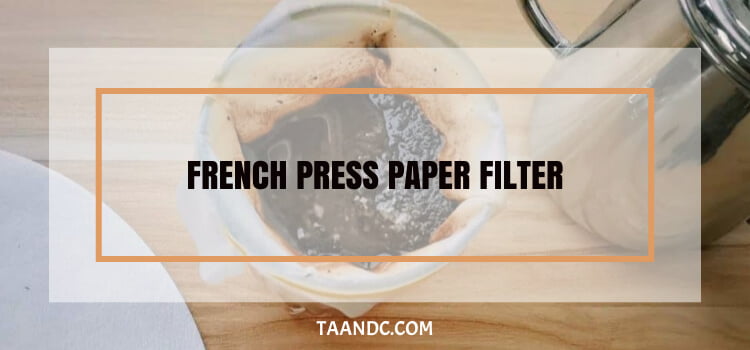Every detail matters when crafting the perfect cup of coffee, and that's precisely where the French Press Paper Filter steps into the spotlight. As a seasoned coffee fan, I've come to appreciate that achieving coffee nirvana often hinges on minor changes, and the French Press Paper Filter is no exception. This unassuming piece of equipment has, time and time again, revolutionized my coffee brewing experience, making it not just smoother but also remarkably cleaner. In the following paragraphs, I'll share my insights and experiences with the French Press Paper Filter, from its incredible ability to keep sediment at bay to its effortless cleanup, all while enhancing the overall quality of your morning brew.

Understanding French Press Paper Filters
Understanding French Press Paper Filters is the key to elevating your coffee brewing game. These unassuming yet indispensable filters are a barrier between your coffee grounds and cup, ensuring a cleaner, smoother brew. They excel at capturing fine coffee particles, preventing them from muddling your morning ritual. Beyond providing a sediment-free experience, these filters offer easy cleanup, making them a practical choice for any coffee enthusiast. Whether you're new to French press coffee or a seasoned pro, embracing the benefits of French Press Paper Filters can lead to consistently delightful and flavorful cups of coffee.
What Are French Press Paper Filters?
French Press Paper Filters are an ingenious addition to coffee brewing. Unlike traditional metal or no-filter filters, these paper filters serve as a fine mesh between you and the coffee grounds. They are designed to capture even the tiniest coffee particles, preventing them from ending up in your cup. This simple yet effective tool produces an endangered and sediment-free brew, commanding a smoother and more refined flavor profile.
Advantages of Using Paper Filters in a French Press
There are numerous advantages of incorporating French Press Paper Filters into your coffee routine:
- They drastically reduce the gritty texture often associated with French press coffee, resulting in a smoother and more enjoyable cup
- Cleanup becomes a breeze as you only need to dispose of the used filter and grounds.
- These paper filters make experimenting with various grind sizes and coffee types easier, allowing you to customize your brew perfctly.
Different Types of French Press Paper Filters
The market has plenty of options regarding French press paper filters. You can choose from disposable, biodegradable, or reusable filters, each with unique features. Some are designed to fit specific French press sizes, while others offer versatility. Exploring the various types available will help you find the perfect match for your brewing needs, whether you prioritize convenience or sustainability.
How to Use French Press Paper Filters
Using French Press Paper Filters is a simple yet transformative process for enhancing your coffee brewing adventure. Start by carefully placing the appropriately sized filter in your French press brew chamber, ensuring a snug fit. Add your freshly ground coffee, paying attention to the grind size. Remember, coarser grinds are ideal for French presses. Pour hot water evenly over the coffee grounds, allowing them to bloom. After the desired steeping time, press down the plunger slowly and steadily. This method ensures that your French Press Paper Filter effectively separates the coffee grounds, delivering a clean and remarkably flavorful brew. You'll elevate your coffee game to new heights with just a few easy steps.
Step-by-Step Guide to Using Paper Filters
Using French Press Paper Filters is a straightforward process that can significantly enhance your coffee brewing experience. Start by selecting the proper size filter for your French press. Place the paper filter in the brew chamber, ensuring it's centred and snugly fit against the sides. Add your coffee grounds to the filter. Remember, the grind size matters; coarser grinds work best with French presses. Next, pour hot water over the coffee grounds, ensuring even saturation. After allowing the coffee to steep, gently press down the plunger. Your French Press Paper Filter has separated the feet, leaving you with a clean and flavorful brew.
Tips for Optimal Results
Use freshly ground coffee beans to achieve the best French Press Paper Filters results. This ensures maximum flavour extraction. Additionally, use water that's just off the boil for brewing. Experiment with your coffee-to-water ratio to find the perfect strength for your taste. Finally, when pressing down the plunger, do so slowly and steadily to minimize agitation, which can lead to over-extraction and bitterness.
Common Mistakes to Avoid
One common mistake when using paper filters is not wetting them before adding coffee grounds. Wetting the filter prevents it from imparting a papery taste to your brew. Another error is using too fine of a coffee grind, which can lead to clogs and difficulty pressing. Overly vigorous plunging can also cause grounds to escape the filter. Avoid these pitfalls, and you'll enjoy the full benefits of your French Press Paper Filter.
Maintaining and Reusing French Press Paper Filters
Maintaining and reusing French Press Paper Filters is a practice that can enhance both your coffee experience and environmental consciousness. To keep these filters, rinse them after each use, occasionally giving them a more thorough cleaning to remove oils and residues. Ensuring they're scorched before storage is crucial for their longevity. As for reuse, it's a matter of personal preference. While it can be cost-effective and eco-friendly, be mindful of potential flavour changes over time. With proper care and a balanced approach to reuse, you can enjoy the benefits of French Press Paper Filters while minimizing waste and maximizing the life of these handy coffee accessories.
Read Also: Free Espresso Machine With Coffee Purchase
Proper Care and Cleaning
Ensuring the longevity of your French Press Paper Filters is a simple but essential task. After each use, carefully remove the used filter from the press. Dispose of the coffee grounds and any residual filter paper. Rinse the filter under running water to remove any remaining coffee oils and residue. For a more thorough clean, you can soak the filter in warm, soapy water, gently scrubbing any stubborn particles. After cleaning, allow the filter to air dry completely before storing it. This straightforward care routine will keep your paper filters in tip-top shape for many brewing sessions.
Can You Reuse Paper Filters?
The question of whether to reuse paper filters is a common one. While some opt for reuse to save money and reduce waste, it's essential to consider the potential downsides. Reusing paper filters may lead to a diminished coffee flavour, as the filter's integrity can degrade with use, allowing more fine particles to pass through. However, if you're determined to reuse, ensure thorough cleaning and drying between services to maintain the filter's performance as much as possible. Ultimately, it's a trade-off between convenience and the quality of your brew, so choose what aligns best with your priorities.
Comparing Paper Filters to Other French Press Filtering Methods
Comparing French Press Paper Filters to other filtering methods is like choosing between different facets of your coffee experience. Paper filters offer a clean, sediment-free brew with a smoother taste, making them an excellent choice for those who enjoy clarity in their coffee. Conversely, while eco-friendly and reusable, metal filters allow more oils and sediment to be filtered, contributing to a more prosperous and bolder flavour profile. Going filterless in your French press journey introduces a unique, oilier mouthfeel, appealing to those who relish the full-bodied coffee experience. Choosing these methods ultimately hinges on your taste preferences, brewing habits, and environmental considerations, adding an exciting layer of customization to your daily cup of joe.
Read Also: Folgers Select Brew Coffee System
Paper Filters vs. Metal Filters in French Press
When filtering your French press coffee, choosing Paper Filters and Metal Filters can significantly impact your brew. Paper filters trap even the finest coffee particles, resulting in a clean, sediment-free cup. They also contribute to a smoother flavor profile. However, they can be single-use and may impart a subtle paper taste if not pre-wetted. On the other hand, Metal Filters are reusable and eco-friendly. Still, they allow more oils and sediment to pass through, which some may find desirable for a fuller-bodied brew. Choosing between paper and metal filters ultimately depends on your taste, convenience, and environmental preference.
Paper Filters vs. No Filter: Which is Better?
The age-old debate of Paper Filters vs. No Filter in French press brewing has its merits on both sides. As mentioned earlier, paper filters offer a cleaner cup free from grit and sediment. In contrast, brewing without any filter can produce a more affluent and oilier mouthfeel, which some coffee enthusiasts prefer. However, it's important to note that going filterless may require a coarser grind to prevent excessive sludge in your coffee. The choice here boils down to your taste preferences; whether you prioritize a cleaner brew or prefer the robust flavors of a filterless French press, both methods have their unique appeal.
Read Also: Flat Bed Coffee
Choosing the Right French Press Paper Filters
Choosing the right French Press Paper Filters is crucial in perfecting your coffee brewing ritual. It begins with selecting the correct size to fit snugly in your French press, ensuring effective filtration. Quality matters, too; opt for filters made from sturdy, taste-neutral materials to preserve the purity of your brew. The choice between disposable convenience and reusable options depends on your preferences and environmental considerations. Trusted brands like Hario, Aeropress, and Able Brewing offer reliable decisions.
At the same time, crafting custom filters from unbleached coffee filter paper for the DIY enthusiast provides a sustainable and satisfying alternative. Your filter choice plays a pivotal role in shaping the quality and flavor of your morning cup, so explore your options wisely to enjoy the perfect brew.
Factors to Consider When Buying Paper Filters
Selecting the ideal French Press Paper Filters involves considering several crucial factors. First and foremost, ensure you choose the correct size filter for your French press. Filters come in various sizes, and a mismatch could result in ineffective brewing. Additionally, prioritize quality materials that won't impart unwanted flavors to your coffee. Look for sturdy filters that withstand the brewing process's heat and moisture. Consider whether you prefer disposable filters for convenience or reusable, eco-friendly options.
Top Brands and Recommendations
Finding the perfect French Press Paper Filters can be made more accessible with recommendations from trusted brands. Brands like Hario, Aeropress, and Able Brewing offer high-quality options known for their performance and durability. Product reviews and user experiences can also provide valuable insights into which brands and specific filter models are well-received by coffee enthusiasts.
DIY Paper Filters
Creating your own DIY paper filters is a satisfying and sustainable option for those who enjoy a hands-on approach. You can fashion filters from unbleached coffee filter paper, cut them to the right size, and fold or shape them to fit your French press. This DIY approach allows for customization and reduces waste, making it an eco-conscious choice for the environmentally aware coffee lover.
FAQ
What is a French Press Paper Filter?
A French Press Paper Filter is a specialized filter used in a French press coffee maker to reduce sediment in the brewed coffee.
Can I reuse French Press Paper Filters?
Reusing paper filters is possible with proper care, but it may affect the quality of your coffee over time.
Are there different sizes of French Press Paper Filters?
French Press Paper Filters come in various sizes to match French press models.
How do I clean and maintain French Press Paper Filters?
To maintain paper filters, rinse them after use and occasionally soak them in warm, soapy water before thorough drying.
What are the advantages of using French Press Paper Filters over metal filters?
French Press Paper Filters offer a cleaner cup with less sediment. At the same time, metal filters allow more oils and residue through for a different flavor profile.
Conclusion
The French Press Paper Filter emerges as a pivotal player in pursuing the perfect cup of French press coffee. Its ability to effectively reduce sediment, resulting in a cleaner and smoother brew, is unmatched. While proper care and maintenance can prolong the life of these filters, the choice to reuse them depends on individual preferences. Exploring different brands' various sizes and materials allows coffee enthusiasts to tailor their brewing experience. Additionally, for those who relish a hands-on approach, crafting DIY paper filters presents a sustainable and customizable option. Whether you prioritize convenience, sustainability, or flavor, the French Press Paper Filter offers a versatile solution to elevate your coffee ritual.


